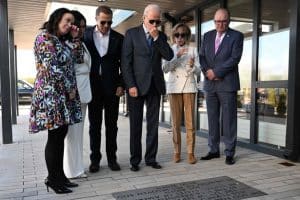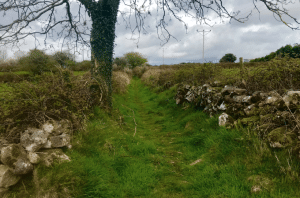Biden seemed to acknowledge the American future no longer looks as good as when my grandparents left Galway.
By Victoria Costello.

Towards the end of my forthcoming novel, Orchid Child, which explores intergenerational legacies and debts in an Irish-American family, an American teenager is walking in a wooded East Galway with an older Irish relative he’s just met, when a gust of wind rises seemingly from nowhere, creating a mini tornado of leaves and twigs, complete with sparks of light and a whirring sound.
“We call that a faerie eddie”, the old man tells his visitor, noting that the Good Folk must be pleased at this meeting of far-flung kin on property still in the family.
I view this bit of folklore as an apt metaphor for the swirl of mixed emotions generated by Joe Biden’s nostalgia-filled visit to Ireland this past week. Like everything else about the relationship between Ireland and its 32 million, far-flung, American kin, it’s complicated.
From both sides of the Atlantic, we shared a laugh about the British display of pique over POTUS relishing his Irish roots for four whole days while skipping the coronation. To which I say, spare us, and Harry and Meghan, too, while you’re at it.
Many can also relate to Fintan O’Toole’s discomfort about Biden’s outdated conflation of Irishness with Catholicism. As is true in both countries, “The Church” is simply no longer THE church. A fair number of us have even gone pagan.
I get that the Republic of our Irish American imagination can be cringeworthy to today’s politically progressive, Euro-Centric Irish public. And yet, Joe Biden makes a good point when he says, “you can be nostalgic about the future”.
Where it gets trickier is when we take in the embarrassed reactions of Irish commentators at Biden’s unabashed displays of sentiment about his Irish roots. I get that the Republic of our Irish American imagination can be cringeworthy to today’s politically progressive, Euro-Centric Irish public. And yet, Joe Biden makes a good point when he says, “you can be nostalgic about the future”.
Whether he intended it or not, I took this line of his to refer to an American future that no longer looks as good as it did when our grandparents left West Ireland for the US Eastern seaboard. The fact is, America today is a holy mess. With an ever-blurring line between church and state and a democracy corroded by Trumpian fascist fantasies, it’s like we’re on a runaway train, watching ourselves return to the bad old days. In comparison, Ireland appears as a bastion of liberal democracy. The ironies abide.
Another Biden oratorical touch on this trip was his repetition of the phrase, “Ireland remembers”, as an invocation of Irish grit and survival against the Great Hunger and centuries of colonial oppression. To the Irish parliament, he used it as a predicate for his assertion that we will, together, address the global food insecurity that is a direct result of climate change. I can’t imagine Biden making that statement at any campaign stop in the US outside of Vermont or California. So what’s going on here? Allow me to digress.

When I first started digging into my Irish roots—my original motivation for doing so was a mental health crisis in one of my sons, which evolved to my researching and writing of a novel based loosely on the family history I’d discovered—I knew nothing more than my Irish grandparents’ names—Michael and Ellen Costello. Not even which county they’d left behind—Galway, as it turns out. This wholesale ignorance, I’ve discovered, is entirely typical. I submit it’s also unhealthy, both for each of us as individuals and for the collective.
Much of the story I pieced together of their real lives after emigrating was as tragic as I imagine their lives would have been had they stayed in Galway, given all hell was about to break loose with the rebellion and a civil war. In America, my grandparents’ chief enemy was the poverty they faced alone, without the safety net of nearby family. Indeed their fates were tragic: Michael’s drowning death at 28; Ellen gone in the 1918 flu epidemic, leaving my five-year-old father Jack to be raised by Ellen’s Mitchell and Lynch sisters.
For my grandparents’ generation, assimilation was a matter of survival, not for themselves, but for those who came after. For my parents, it was more of a choice. I remember my mother expressing no interest in keeping in touch with any relatives with an address outside the Tri-state area. For me and my siblings, assimilation was a done deal. Ireland a fading story dragged out on St. Patrick’s Day or should the subject of JFK arise.
But at what cost? This is the question I grappled with as I wrote what became Orchid Child. The protagonist of my novel, Kate, is a neuroscientist, her family’s third generation success story, who brings her neurodiverse nephew (the teenager at the faerie eddie) to West Ireland, unaware that she’s set foot on the same ground her grandparents fled eighty years earlier. The choice of this scientific specialty for my main character, who is, after all, my alter ego, reflects my fascination with the epigenetics of generational trauma. How the effects of famine, war, poverty, genocide, forced immigration extend across generations and shape our mental and physical health. One of the first Ireland-specific research papers I came across that invoked this still emerging scientific principle was done by Dermot Donaldson, who applied it to a new paradigm for psychotherapeutic treatment of Troubles-related, PTSD in Northern Ireland. His paper contained a poetic phrasing that you’ll see invoked frequently by researchers working in this field.
“The generations are boxes within boxes: inside my mother’s violence you find another box, which contains my grandmother’s violence, and inside that box you would find another box with some such black, secret energy – stories within stories, receding in time”.
To borrow from Joan Didion, who famously pointed out that we tell ourselves stories in order to live, I also wonder if we don’t change the stories we tell ourselves—in order to heal.
But what are we healing, exactly?
along with being the beneficiaries of our grandparents’ American dream, we inherited a subterranean fear that we don’t really belong anywhere. And this contributes to another major American problem. That our country displays such an appalling lack of empathy towards immigrants
I’ve come to believe that along with being the beneficiaries of our grandparents’ American dream, we inherited a subterranean fear that we don’t really belong anywhere. And this contributes to another major American problem. That our country, the land of immigrants, displays such an appalling lack of empathy towards any new wave of immigrants to our shores. No one thing ever tells the whole story, but I suspect our mixed, unconscious emotions about a lost homeland, in this case Ireland, can provide a window on parts of us we lost and might still retrieve.
It’s in this context that Joe Biden’s sentimentality—and mine—can perhaps best be understood.
My visits to Galway produced far more powerful emotions in me than I ever imagined possible. The sense of being connected to a place, particularly when I located the ruins of my grandfather’s family cottage in an East Galway township, was uncanny. Call it quantum entanglement or plain old sentimentality, the feelings were overwhelming. After I found a cousin, Liam Costello, who shared things with me that he’d heard from his grandfather, William, about the five (out of nine) Costello siblings who’d emigrated, including my grandfather Michael, it all started to make sense. Our grandfathers were siblings. The fact that none of those who left ever returned, or that Liam and I didn’t know the other existed two years ago, doesn’t change the power of the blood connection between us. Or the relationship of those like me, and Joe Biden, three, four, or even five generations removed—to the land of our ancestors.
as Joe Biden challenges us to remember who we are, it should come as no surprise to find that Ireland—a thoroughly modern country with an extraordinarily enhanced sense of place —feels closer and more vital than ever.
One thing that Liam said that day sticks with me. How, back then, because so many in the West had siblings and children who’d gone to Manhattan and the Bronx, those New York boroughs felt closer to Galway than Dublin. So, as Joe Biden challenges us to remember who we are, it should come as no surprise to find that Ireland—a thoroughly modern country with an extraordinarily enhanced sense of place —feels closer and more vital than ever.
Victoria Costello is a writer and teacher of memoir and fiction living in Ashland, Oregon. Her debut novel, Orchid Child, is releasing worldwide on June 13, 2023, from Between the Lines Publishing. Find out more at her author website, www.victoriacostelloauthor.com
![]()